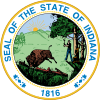
Presidential elections were held in the United States on November 4, 1884. Democratic Governor Grover Cleveland of New York narrowly defeated Republican James G. Blaine of Maine. It was set apart by mudslinging and personal allegations that eclipsed substantive issues, such as civil administration change. Cleveland was the first Democrat elected president of the United States since James Buchanan in 1856, the first to hold office since Andrew Johnson left the White House in 1869, and the last to hold office until Woodrow Wilson, who began his first term in 1913. For this reason, 1884 is a significant election in U.S. political history, marking an interruption in the era when Republicans largely controlled the presidency between Reconstruction and the Great Depression.

Presidential elections were held in the United States on November 6, 1888. Republican nominee Benjamin Harrison, a former U.S. senator from Indiana, defeated incumbent Democratic President Grover Cleveland of New York. It was the third of five U.S. presidential elections in which the winner did not win the national popular vote, which would not occur again until the 2000 US presidential election. Cleveland was the last incumbent Democratic president to lose reelection until Jimmy Carter in 1980.
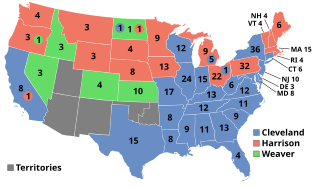
Presidential elections were held in the United States on November 8, 1892. In the fourth rematch in American history, the Democratic nominee, former president Grover Cleveland, defeated the incumbent Republican President Benjamin Harrison. Cleveland's victory made him the first president in American history to be elected to a non-consecutive second term, a feat not repeated until Donald Trump was elected in 2024. The 1892 election saw the incumbent White House party defeated in three consecutive elections, which did not occur again until 2024.

Thomas Andrews Hendricks was an American politician and lawyer from Indiana who served as the 16th governor of Indiana from 1873 to 1877 and the 21st vice president of the United States from March until his death in November 1885. Hendricks represented Indiana in the U.S. House of Representatives (1851–1855) and the U.S. Senate (1863–1869). He also represented Shelby County, Indiana, in the Indiana General Assembly (1848–1850) and as a delegate to the 1851 Indiana constitutional convention. In addition, Hendricks served as commissioner of the United States General Land Office (1855–1859). Hendricks, a popular member of the Democratic Party, was a fiscal conservative. He defended the Democratic position in the U.S. Senate during the American Civil War and Reconstruction era and voted against the Thirteenth, Fourteenth, and Fifteenth Amendments to the U.S. Constitution. He also opposed Radical Reconstruction and President Andrew Johnson's removal from office following Johnson's impeachment in the U.S. House.
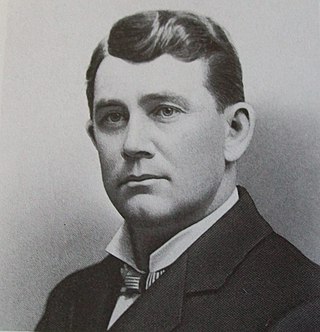
James Franklin Hanly was an American politician who served as a congressman from Indiana from 1895 until 1897, and was the 26th governor of Indiana from 1905 to 1909. He was the founder of Hanly's Flying Squadron, which advocated prohibition nationally and played an important role in arousing public support for prohibition.

John Marshall Hamilton was the 18th Governor of Illinois, serving from 1883 to 1885. Born in Union County, Ohio, Hamilton became interested in politics at a young age, joining the Wide Awakes when he was thirteen and the Union Army four years later. After graduating from Ohio Wesleyan University he studied law and was admitted to the bar. A notable attorney in Bloomington, Illinois, Hamilton was elected to the Illinois Senate in 1876. He served there until 1881, when he was elected Lieutenant Governor of Illinois on a ticket with Shelby Moore Cullom. When Cullom resigned after election to the United States Senate, Hamilton became Governor of Illinois. He was not selected as a candidate for re-election, but did serve that year as a delegate to the 1884 Republican National Convention. He spent the rest of his life as an attorney in Chicago, where he died in 1905.

Isaac Pusey Gray was the 18th and 20th governor of the U.S. state of Indiana from 1880 to 1881 and from 1885 to 1889. Originally a Republican, he oversaw the forceful passage of the post-American Civil War constitutional amendments while he was a member of the Indiana Senate. He became a Democrat following the corruption of the Administration of Ulysses S. Grant but was regularly stymied by his Democratic adversaries who constantly referred to his tactics while a Republican, earning him the nickname "Sisyphus of the Wabash."

Claude Matthews was an American politician who served as the 23rd governor of the U.S. state of Indiana from 1893 to 1897. A farmer, he was nominated to prevent the loss of voters to the Populist Party. The Panic of 1893 occurred just before he took office, leading to severe economic problems during his term. Republicans took the Indiana General Assembly in the 1894 mid-term election and repudiated many of the Democrats' laws, leading to violence in the assembly. A popular party figure when he left office, he was a nominee to run for president at the 1896 Democratic National Convention, but lost his bid for the nomination to William Jennings Bryan.

Benjamin Franklin Shively was an American politician and lawyer who served as a United States Representative and Senator from Indiana.

William Sylvester Taylor was an American politician who was the 33rd Governor of Kentucky. He was initially declared the winner of the disputed gubernatorial election of 1899, but the Kentucky General Assembly, dominated by the Democrats, reversed the election results, giving the victory to his Democratic opponent, William Goebel. Thus, Taylor served only 50 days as governor.
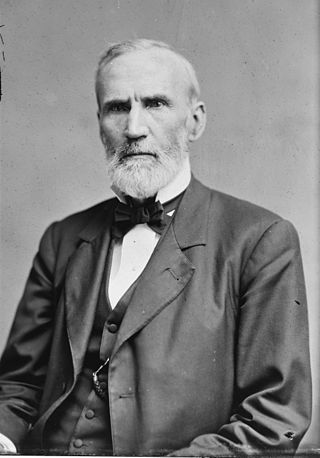
George Washington Julian was a politician, lawyer, and writer from Indiana who served in the United States House of Representatives during the 19th century. A leading opponent of slavery, Julian was the Free Soil Party's candidate for vice president in the 1852 election and was a prominent Radical Republican during the American Civil War and the Reconstruction era.
The lieutenant governor of Indiana is a constitutional office in the US state of Indiana. Republican Micah Beckwith, who assumed office January 13, 2025, is the incumbent. The office holder's constitutional roles are to serve as the president of the Indiana Senate, become acting governor during the incapacity of the governor, and become governor should the incumbent governor resign, die in office, or be impeached and removed from office. Lieutenant governors have succeeded ten governors following their deaths or resignations. The lieutenant governor holds statutory positions, serving as the head of the state agricultural and rural affairs bureaus, and as the chairman of several state committees.
The 1892 Democratic National Convention was held in Chicago, Illinois, from June 21 to 23, 1892. and nominated former President Grover Cleveland, who had been the party's standard-bearer in 1884 and 1888. Adlai Stevenson I of Illinois was nominated for vice president. The ticket was victorious in the general election, defeating the Republican nominees, President Benjamin Harrison and his running mate, Whitelaw Reid.
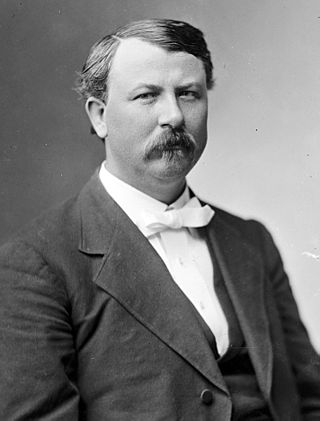
William Henry Calkins was an American lawyer and Civil War veteran who served four terms as a U.S. Representative from Indiana from 1877 to 1884.
The 1888 Democratic National Convention was a nominating convention held June 5 to 7, 1888, in the St. Louis Exposition and Music Hall in St. Louis, Missouri. It nominated President Grover Cleveland for reelection and former Senator Allen G. Thurman of Ohio for vice president.
The 1884 Democratic National Convention was held July 8–11, 1884 and chose Governor Grover Cleveland of New York their presidential nominee with the former Governor Thomas A. Hendricks of Indiana as the vice presidential nominee.

The Black Day of the General Assembly was February 24, 1887, on which date the Indiana General Assembly dissolved into legislative violence. The event began as an attempt by Governor Isaac P. Gray (D) to be elected to the United States Senate and his own party's attempt to thwart him. It escalated when the Democratic-controlled Indiana Senate refused to seat the newly elected lieutenant governor, Robert S. Robertson, after being ordered to do so by the Indiana Supreme Court. When Robertson attempted to enter the chamber he was attacked, beginning four hours of intermittent fighting that spread throughout the Indiana Statehouse. The fight ended after Republicans and Democrats began threatening to kill each other and the Governor ordered police to get the situation under control. Subsequently, the Republican-controlled House of Representatives refused to communicate with the Democratic Senate, ending the legislative session.

The 1876 United States elections were held on November 7. In one of the most disputed presidential elections in American history, Republican Governor Rutherford B. Hayes of Ohio ended up winning despite Democratic Governor Samuel J. Tilden of New York earning a majority of the popular vote. The Republicans maintained their Senate majority and cut into the Democratic majority in the House.

Francis Triplett Hord Jr. was an American lawyer, politician, and judge who served as the thirteenth Indiana Attorney General from November 6, 1882, to November 22, 1886.
Louis Theodore Michener was an American lawyer and politician who served as the fourteenth Indiana Attorney General from November 22, 1886 to November 22, 1890. Michener also served on the staff of President Benjamin Harrison as both a campaign manager and political adviser.

